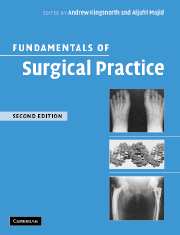Book contents
- Frontmatter
- Contents
- Preface
- Contributors
- 1 Preoperative management
- 2 Principles of anaesthesia
- 3 Postoperative management
- 4 Nutritional support
- 5 Surgical sepsis: prevention and therapy
- 6 Surgical techniques and technology
- 7 Trauma: general principles of management
- 8 Intensive care
- 9 Principles of cancer management
- 10 Ethics, legal aspects and assessment of effectiveness
- 11 Haemopoietic and lymphoreticular systems: anatomy, physiology and pathology
- 12 Upper gastrointestinal surgery
- 13 Lower gastrointestinal surgery
- 14 Hernia management
- 15 Vascular surgery
- 16 Endocrine surgery
- 17 The breast
- 18 Thoracic surgery
- 19 Genitourinary system
- 20 Head and neck
- 21 The central nervous system
- 22 Musculoskeletal system
- 23 Paediatric surgery
- Index
7 - Trauma: general principles of management
Published online by Cambridge University Press: 15 December 2009
- Frontmatter
- Contents
- Preface
- Contributors
- 1 Preoperative management
- 2 Principles of anaesthesia
- 3 Postoperative management
- 4 Nutritional support
- 5 Surgical sepsis: prevention and therapy
- 6 Surgical techniques and technology
- 7 Trauma: general principles of management
- 8 Intensive care
- 9 Principles of cancer management
- 10 Ethics, legal aspects and assessment of effectiveness
- 11 Haemopoietic and lymphoreticular systems: anatomy, physiology and pathology
- 12 Upper gastrointestinal surgery
- 13 Lower gastrointestinal surgery
- 14 Hernia management
- 15 Vascular surgery
- 16 Endocrine surgery
- 17 The breast
- 18 Thoracic surgery
- 19 Genitourinary system
- 20 Head and neck
- 21 The central nervous system
- 22 Musculoskeletal system
- 23 Paediatric surgery
- Index
Summary
Trauma is the leading cause of deaths in patients under the age of 40 years and consequently is the leading cause of loss to productive years of life. More than 7,000 patients per year die from trauma in the UK (more deaths than from cancer of the stomach or pancreas) and up to 7% of all hospital care and UK National Health Service (NHS) expenditure is due to trauma care. These figures show the importance of trauma as a health problem but the true scale of the problem only begins to become clear when it is appreciated that approximately 10 times more patients do not die but are temporarily incapacitated as a result of injury. Much of current surgical practice has its roots in the surgery of trauma and as such many of the principles of management have been well defined for many years. However, it has been well documented that for each new advance, there has been a tendency to forget some of the previously established principles, often with disastrous consequences, particularly in times of war. This chapter therefore focuses more on the general principles of management than on the treatment of specific injuries, although both will be covered. One of the most basic principles of management is the importance of prompt treatment and, given the magnitude of the trauma problem, it will be seen that organisation of trauma services form an important part of these considerations.
- Type
- Chapter
- Information
- Fundamentals of Surgical Practice , pp. 89 - 110Publisher: Cambridge University PressPrint publication year: 2006

